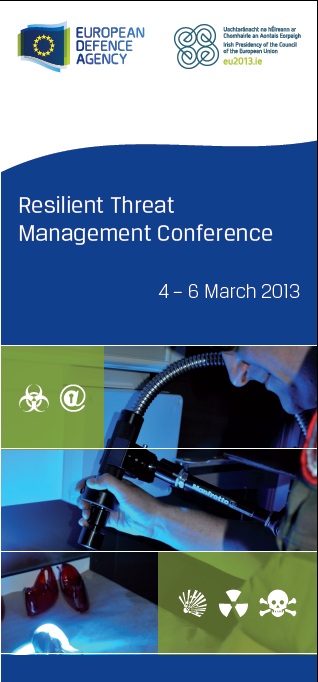 Three days of the Resilient Threat Management 2013 conference and the conclusion is undisputed – IEDs are here to stay and the only way to defeat them is through a comprehensive approach at a global level drawing on the strengths of both military and civil security resources.
Three days of the Resilient Threat Management 2013 conference and the conclusion is undisputed – IEDs are here to stay and the only way to defeat them is through a comprehensive approach at a global level drawing on the strengths of both military and civil security resources.
Resilient Threat Management 2013 – a partnership between the Irish Presidency of the Council of the European Union and the EDA –aimed at taking stock of all the efforts to date dedicated to Countering Improvised Explosive Devices (C-IED) while pointing the direction to the future. IEDs have existed for hundreds of years and there is a consensus that they will continue to exist for many more years to come. What complicates things is that they are employed by networks adversaries that range from terrorists to organised criminals affecting both the European homeland as well as crisis zones around the world. Each of these adversary networks have an agenda and employ IEDs along with other types of asymmetric methods to achieve their goals, with no consideration to civilian bi-standers. The consequences are heartbreaking tragedies.
Resilient Threat Management 2013 saw experts come together for two days to share information, experiences and ideas on how to take C-IED to the next phase. At the end of current operations, the fight against IEDs will continue but in a different way. Experts delved into the overarching strategic aspects as well as discussing the future of specifics such as forensic exploitation – its dual-use nature and its role as the hub for intelligence building, evidence gathering and for technology development. Scientists provided further insights into novel approaches to defeating the network, detection technologies, neutralisation techniques and deployable forensics.
The third and final day brought decision-makers to the table. With Professor Sven Biscop (Egmont Institute) addressing the EU’s role in future crisis management, Dr Jamie SHEA (NATO) spoke about the complexities of asymmetric warfare. A panel with representatives from the IHS, EU Military Staff, Irish Defence Forces, Guardia Civil and RUSI then addressed what threat management needs to be like beyond 2020. A second panel with representatives FRIDE, EDA, FBI, An Garda Siochana, EUROPOL and OSCE explored how we can solidify inter-institutional cooperation platforms, within Europe and also outside.
Ciaran Murphy (Irish Department of Defence) addressed the need for the EU to mirror President Barak Obama’s recent C-IED policy statement. Peter Round and Graham Muir (EDA) spoke about EDA’s role in developing a comprehensive strategy for Member States in partnership with other institutions in order to establish a vehicle for ensuring that we are prepared to tackle the evolving threats in a resilient manner.
Many lives have been lost in combating the IEDs. Many more lives have been lost in relearning how to combat IEDs. We cannot afford to repeat this learning process costing more lives. Resilient Threat Management 2013 has shown that there is a will among experts, decision makers, Member States and institutions to work together and to build on the current momentum. The fight against the IED needs to continue. It must, however, do so as part of a comprehensive approach to managing the evolution of asymmetric threats and their networks. Preparedness and resilience are key to success.
More information: